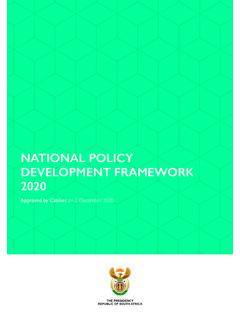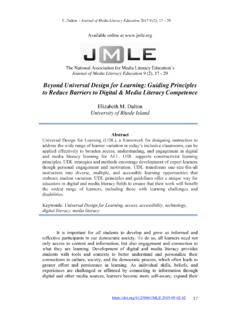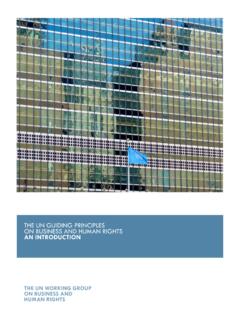Transcription of Standards of Conduct for the International Civil Service
1 Standards of Conduct for the International Civil Service International Civil Service COMMISSION United Nations New York, 2013 2 FOREWORD For more than a half-century the International Civil Service has been guided and inspired by the Standards of Conduct in the International Civil Service drafted by the International Civil Service Advisory Board in 1954. Though some of the tone and content of the 1954 edition evokes an earlier era, the underlying raison d tre for the Standards , and indeed the principles themselves, have largely stood the test of time.
2 However, as the world has changed over the decades, so has the nature of services provided by United Nations common system organizations with the ascendancy and pervasiveness of technology and the shifts in the relationships and interactions taking place both internally and externally in the organizations. A periodic reexamination and updating of the Standards was required to reflect this world in transition. Guided by its Framework for Human Resources Management approved by the General Assembly in 2000, ICSC has now twice revised the Standards , first in 2001 and again with this edition which was approved by the United Nations General Assembly in its resolution 67/257.
3 The ICSC Framework sets the tone, stating that "although organizations' internal cultures may vary, they face similar ethical challenges . Over the years, the relationship between staff members and their organizations had evolved. Most organizations had undergone significant reforms and moved away from rules-based to values and results-based systems with increased decentralization and greater responsibilities to lower level management. Those developments demanded clearer Standards in relation to contacts outside the common system and more transparent accountability systems.
4 A renewed interest in the subject on the part of national Civil services and the private sector in responding to new ethical challenges was a further stimulus to this revised text. The title, Standards of Conduct for the International Civil Service , remains as self-explanatory now as it was in 1954. Like the versions before them, these revised Standards are intended as a behavioral and ethical guide. They exist to inform, but also to inspire us and, when needed, to provide explanations.
5 They reflect the philosophical underpinnings of the International Civil Service and inform its conscience. We trust that like the previous version, the present Standards become an indispensable part of the culture and heritage of the organizations and are of similarly enduring quality. 3 Standards OF Conduct FOR THE International Civil Service 2013 Introduction 1. The United Nations and the specialized agencies embody the highest aspirations of the peoples of the world.
6 Their aim is to save succeeding generations from the scourge of war and to enable every man, woman and child to live in dignity and freedom. 2. The International Civil Service bears responsibility for translating these ideals into reality. It relies on the great traditions of public administration that have grown up in member States: competence, integrity, impartiality, independence and discretion. But over and above this, International Civil servants have a special calling: to serve the ideals of peace, respect for fundamental rights, economic and social progress, and International cooperation.
7 It is therefore incumbent on International Civil servants to adhere to the highest Standards of Conduct ; for, ultimately, it is the International Civil Service that will enable the United Nations system to bring about a just and peaceful world. guiding principles 3. The values that are enshrined in the United Nations organizations must also be those that guide International Civil servants in all their actions: fundamental human rights, social justice, the dignity and worth of the human person and respect for the equal rights of men and women and of nations great and small.
8 4. International Civil servants should share the vision of their organizations. It is loyalty to this vision that ensures the integrity and International outlook of International Civil servants; a shared vision guarantees that they will place the interests of their organization above their own and use its resources in a responsible manner. 5. The concept of integrity enshrined in the Charter of the United Nations embraces all aspects of an International Civil servant s behaviour, including such qualities as honesty, truthfulness, impartiality and incorruptibility.
9 These qualities are as basic as those of competence and efficiency, also enshrined in the Charter. 6. Tolerance and understanding are basic human values. They are essential for International Civil servants, who must respect all persons equally, without any distinction whatsoever. This respect fosters a climate and a working environment sensitive to the needs of all. To achieve this in a multicultural setting calls for a positive affirmation going well beyond passive acceptance.
10 47. International loyalty means loyalty to the whole United Nations system and not only to the organization for which one works; International Civil servants have an obligation to understand and exemplify this wider loyalty. The need for a cooperative and understanding attitude towards International Civil servants of other United Nations organizations is obviously most important where International Civil servants of several organizations are serving in the same country or region.


